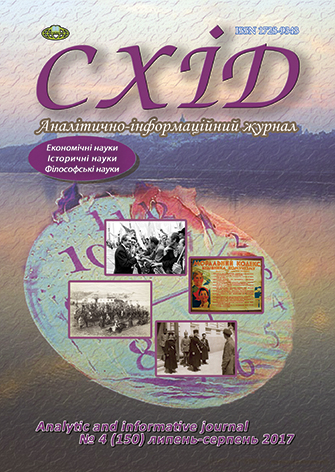Strategic-relational approach in Bob Jessop's political philosophy
DOI:
https://doi.org/10.21847/1728-9343.2017.4(150).111561Keywords:
state, politics, strategic-relational approach, ontology, social relations, ideologyAbstract
The article deals with conceptual framework of ontological study of the state as a complex social phenomenon, which is now under going the essential trans formations caused by global processes. Research focuses on political and philosophical explication of the state concept by the British theorist Bob Jessup. Strategic-relational approach to the definition of the concept of state proposed by B. Jessop is proved to have considerable heuristic potential.
In a post-structuralist way, B. Jessop tries to outline the positivity of power in he rent in its concrete historical hypostasis - the state power: The strategic and relational approach emphasizes that there is no reason to assume that state power is limited by imperative coordination - centralized planning and down ward management. State power can be exercised not only in the form of coercion, command, planning and bureaucracy, but also in the form of networks, partnerships, solidarity, etc. In this context, the state appears to bean institution a matrix for political debate on responses to certain challenges by means of governance As a matter of fact, the theory seems to be such a complement to post-structuralist philosophy, where the concept of the statewide is solved in the elements of power as a type of structure, and not the generic form of political existence.
B. Jessop's approach is an interesting variant of the use of post-structuralist ontology to the state. The civilization challenge that forces the conservative branches of law and the theory of the state to develop the assets of avant-garde philosophy is the formation of a global society that shifts foundations of the traditional national state.Downloads
References
Jessop B. (2016), The State: Past, Present, Future, Polity, Cambridge, 316 p.
Weber M. Politik als Beruf [Internetquelle]. Available at: http://gutenberg.spiegel.de/buch/politik-als-beruf-8139/2
Mykhalchenko M. (2016), Transformation of the political institutions ofUkraine: problems of theory and practice, IPENI, Kyiv, 440 p. (ukr)
Braichevskyi M. On Ukrainian Statehood [Online material], Available at: http://shron.chtyvo.org.ua/Braichevskyi_Mykhailo/Pro_ukrainsku_derzhavnist.pdf (ukr)
Polegkyi O. (2015), Identity-building in Post-communist Ukraine: Post-imperial vs Post-colonial Discourses. In: Beyond Transition? Memory and Identity Narratives in Eastern and Central Europe, Lund University, Lund. P. 169-190.
Iosypenko O. (2017), Ontology of collective entities, Filosofska Dumka, Vol. 1, pp.92-107. (ukr)
Kennett P. (2017), Handbook of European Social Policy, Edward Elgar Publishing,Cheltenham, 480 p., DOI: http://dx.doi.org/10.4337/9781783476466
Springer S. (2016), Handbook of Neoliberalism, Routledge, New York, 664 p.
Bullard A. R. (2016), Book review: The State: Past, Present, Future by Bob Jessop [Online material]. [Available at]: http://blogs.lse.ac.uk/lsereviewofbooks/2016/09/06/book-review-the-state-past-present-futures-by-bob-jessop/
Hay C. (2006), The State: theories and issues, Palgrave Macmillan, Basingstoke, 330 p., doi.org/10.1007/978-0-230-80227-8
Downloads
Published
How to Cite
Issue
Section
License
Copyright (c) 2017 Andriy Karpenko, Kateryna Belousova

This work is licensed under a Creative Commons Attribution-NonCommercial-NoDerivatives 4.0 International License.
1. Authors bear responsibility for the accuracy of facts, quotations, numbers and names used.
2. Manuscripts are not sent back.
3. The publisher does not always agree with the authors' opinion.
4. The authors reserve the right to authorship of the work and pass the first publication right of this work to the journal under the terms of a Creative Commons Attribution-NonCommercial-NoDerivatives 4.0 International License. This license allows others to distribute (copy) the published work for non-commercial purposes, provided there is mandatory attribution to its authors and a link to the first publication in our journal.
5. The authors have the right to conclude separate supplement agreements that relate to non-exclusive work distribution in the form in which it has been published by the journal (for example, to upload the work to the online storage of the journal or publish it as part of a monograph), provided that the reference to the first publication of the work in this journal is included.

